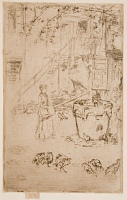Turkeys | ||
| Number: | 236 | |
| Date: | 1880 | |
| Medium: | etching and drypoint | |
| Size: | 209 x 135 mm | |
| Signed: | butterfly at lower left (2) | |
| Inscribed: | no | |
| Set/Publication: | 'Second Venice Set', 1886 | |
| No. of States: | 2 | |
| Known impressions: | 42 | |
| Catalogues: | K.199; M.196; W.165 | |
| Impressions taken from this plate (42) | ||
KEYWORD
baby, bird, cat, child, courtyard, genre, people, trellis, turkey, vine, well, woman, woman standing.
TITLE
There are no real variations in the title, except for the occasional article; see for example:
'Turkeys' (1882, Whistler). 1
'Turkeys' (1883, F.A.S.) 2
'Turkeys' (1886, Frederick Wedmore (1844-1921)). 3
'The Turkeys' (1901, Glasgow). 4
It was called 'Turkeys' when published in A Set of Twenty-six Etchings (the '2nd Venice Set') in 1886, and in most published catalogues.
'Turkeys' (1882, Whistler). 1
'Turkeys' (1883, F.A.S.) 2
'Turkeys' (1886, Frederick Wedmore (1844-1921)). 3
'The Turkeys' (1901, Glasgow). 4
It was called 'Turkeys' when published in A Set of Twenty-six Etchings (the '2nd Venice Set') in 1886, and in most published catalogues.
1: Whistler to T. McLean, 28 August 1882, GUW #13643.
2: London FAS 1883 (cat. no. 7).
3: Wedmore 1886 A (cat. no. 165).
4: Glasgow 1901 (cat. no. 216).
DESCRIPTION
A young woman stands in a courtyard, holding two containers, possibly tin pails. To right of her is a large stone well-head. There are turkeys in the foreground, on the well and well-curb, and beyond it. At the back of the courtyard are stone steps guarded by wooden railings, which lead to a landing at upper right, with doors opening onto it. A woman and baby stand in the door to right and an older woman sits in front, on the landing. Two children are descending the stairs. On the wall at left there is a window with small panes, and above it, an open window with shutters. In the centre is a large anchor, leaning on the wall behind the young woman. On the right, at the far side of the courtyard, stands a boy leaning on a window ledge, with a rough wooden shutter open wide behind him, and a cat on the protruding lintel above. Across the top of the courtyard vines hang from a spindly wooden frame.
SITE
The Corte Delfina, a small courtyard off the Rio de la Tana, north of the Via Garibaldi in Venice, was quite near where Whistler was staying at the Casa Jankowitz on the Riva. 5
5: Grieve 2000, pp. 128-129, 131.
Wedmore called it 'the squalid courtyard-garden of a poor Venetian house.' 6 It was - and is - a very quiet court a stone's throw from the broad, bustling Via Garibaldi and the Riva San Biagio. The view, drawn accurately on the copper plate, is reversed, as usual, in the print.
6: Wedmore 1886 A (cat. no. 165).
DISCUSSION
Whistler often included birds in the foreground of his etchings. In Venice, he included more pigeons than tourists in The Piazzetta [218]. A few years later, in 1888, he etched fluttering fowls in, for instance, The Hôtel de la Croix Blanche [395] and Market Women: Turkeys [424], where the ungainly birds dominate the foreground, with local (in that case French) women selling them.
Raising birds was women's work, and epitomised their small-scale domestic and economic activities.




